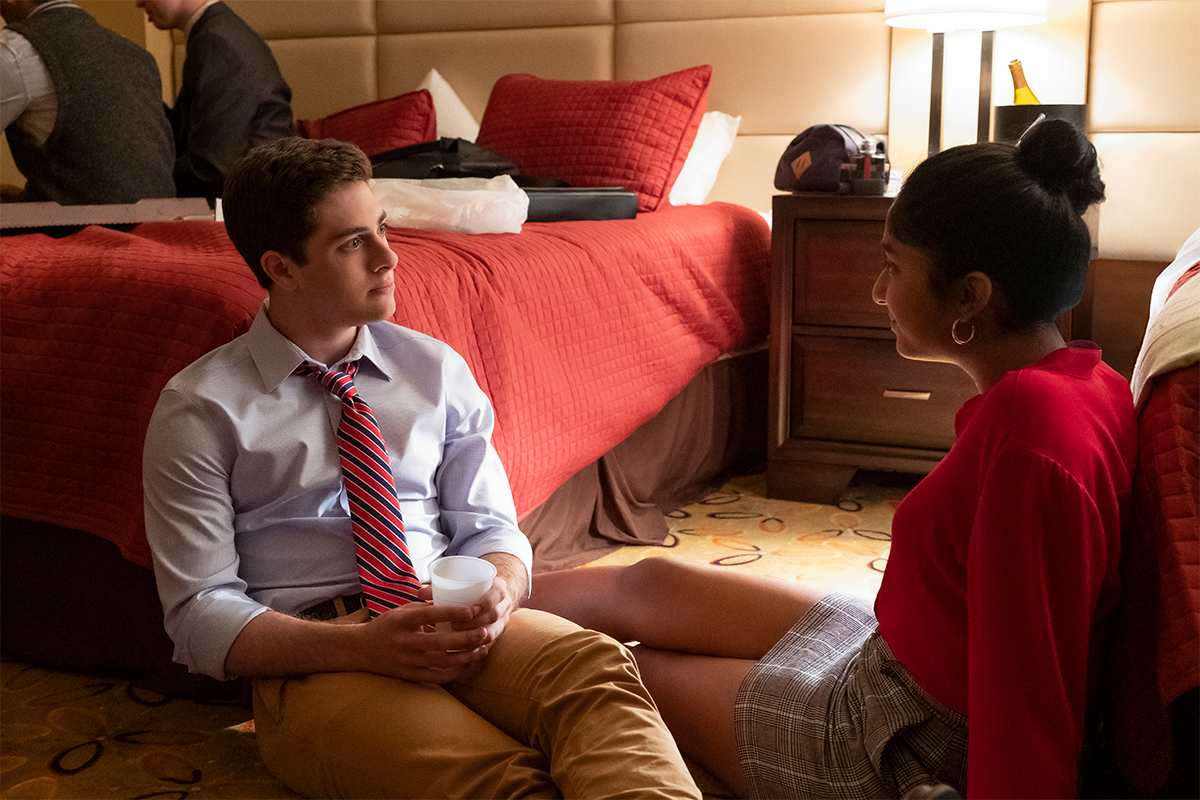Last weekend, I watched every episode of the new Netflix series Never Have I Ever within a day. This might be because I’m getting a bit bored after logging 200 hours of gameplay on Animal Crossing New Horizons, but even under ordinary circumstances, this high school dramedy would be easy to fall in love with.
Created by Mindy Kaling and Lang Fisher, Never Have I Ever follows Devi Vishwakumar (played by first-time Hollywood actress Maitreyi Ramakrishnan), a 15-year-old who wants to lose her virginity just as much as she wants to get into Princeton. In the wake of her father’s unexpected death, she doesn’t want to think about her loss; instead, she wants to get a boyfriend, get invited to a “no parents party,” and outshine her academic arch rival, Ben Gross.
Though I loved watching Gossip Girl in high school (especially the Passover episode), I wish that there had been a show like Never Have I Ever, which stars three unabashedly brilliant young women of color. Along with Devi, there’s her best friends Fabiola Torres (Lee Rodriguez), who first comes out as gay to a robot that she built and programmed herself, and Eleanor Wong (Ramona Young), who rocks embarassingly eccentric outfits (“sexy flapper girl”) with confident ease, then scores the lead role in the school play.
Even if I can’t directly relate to Devi’s experiences as a first-generation Indian American, the nuanced perspectives of these characters demonstrate what makes diversity in TV castings and writers rooms so necessary. When we can connect with characters (and people) who don’t look like us, we reinforce the idea that more unites us than what divides us.
At the same time, Never Have I Ever encourages us to celebrate what makes us different. When Devi runs into her friend Harish, a Stanford student, at a Ganesh Puja, she asks, “Why are you at this lame-fest? When I get into Princeton, I’m never coming back. I’m gonna be an atheist who eats cheeseburgers every day and has a white boyfriend.” Harish explains that when he went to college and saw how proud his roommate was of being Native American, he questioned why he ever felt embarrassed of his Indian heritage. He says, “Am I going to be this insecure Indian guy who hates doing Indian things? ‘Cause that’s it’s own identity. It’s just a shitty one.” (This is reflective of Kaling’s own experience bonding with her Native American roommate at Dartmouth, she says in an NPR interview.)
Given how Never Have I Ever shines in these moments, it’s especially confusing to see how flat Devi’s Jewish nemesis Ben Gross (Jaren Lewison) seems when compared with characters like the queer Afro-Latina robotics wiz. Since they were children, we’re told, Ben and Devi have been the smartest kids in class. They even brokered an “Extracurricular Contract Agreement,” which splits all extracurricular activities (except sports) down the middle to avoid conflict.
But Devi doesn’t hate Ben for being as smart as her — she hates him because he’s a dick. He gets the entire school to call Devi and her friends “the UN,” but he clarifies that it’s “not racist.” It stands for “unfuckable nerds” rather than “United Nations.”
One of the show’s most controversial moments comes in a history class about the Holocaust. When Ben makes a snide remark, Devi says, “I wished the Nazis would kill Ben.” Yikes! In the same NPR interview, Kaling says, “I think it’s easier for our character to lash out […], to say things that could potentially be offensive because it’s like, OK, well, you know, [Indian American women] don’t have a ton of power in this country right now.”
I do find myself able to forgive Devi — she’s a teenage girl with self-destructive tendencies, and she’s going through some rough stuff — but I don’t blame viewers who can’t shake off the comment as quickly as Ben does when she apologizes to him. What’s perhaps more potentially harmful than Devi’s comment, though, is the depiction of Ben’s Jewish identity, which rarely feels more developed than these cheap punchlines.
His father is a powerful entertainment lawyer, which he drops into conversation whenever possible; the NBA star Blake Griffin attended his bar mitzvah, which was held at the Dolby Theater (where the Oscars are held, Devi points out). A rich Jewish lawyer who spoils his kid? Stop me if you’ve heard that one before.
Then, there’s Ben’s academic excellence and over-achieving tendencies (the Asian characters exhibit these traits as well), but even positive stereotypes are harmful — they normalize the impulse to make assumptions about people based on their identities alone.
In history class, when the students must come up with an app idea that would save the Jews from the Nazis (oy vey), Ben proposes “Jewber,” a ride-sharing app to help the Jews escape. The other students in his group aren’t sold. “It’s an app that tells a stranger the exact location of a Jewish person and sends a car to round them up,” Eleanor points out. “Whatever, you’re all hating on it because you’re anti-Semitic,” Ben replies. His classmate Eve then points out she’s Jewish too, but we don’t learn anything more about that facet of her identity. I appreciate the terrible wordplay of “Jewber,” but still, it feels lazy for a TV writers’ room to resort to Holocaust jokes in order to address an antagonistic character’s Jewishness.
Ben becomes more sympathetic as the season goes on — he even gets his own episode, narrated by Andy Samberg. When Ben’s career-focused father leaves for a Caribbean business trip on Ben’s birthday, we discover how lonely Ben feels, despite his wealth. He gets a huge zit, then cries during a dermatology appointment with Devi’s mom when he realizes he can’t remember the last time he ate dinner with his parents. Eventually, Ben and Devi become more tolerant of each other, realizing how many insecurities they share. They strive for academic excellence because they think it will make their parents love them more; they worry that their peers wouldn’t like them if not for their money (in Ben’s case) or their lies (in Devi’s case).
Even as Ben becomes more redeemable, I can’t help but wonder why Devi’s arch rival needed to be Jewish when this identity only comes into play as the butt of a joke. But who knows — maybe in season 2, as Ben morphs into a potential love interest, we’ll find this not-always-nice Jewish boy confronting his Jewish identity in a more meaningful way (like arguing with relatives about the Israel-Palestine conflict, or Bill de Blasio’s Twitter presence). Never Have I Ever isn’t, and shouldn’t, be centered on Ben’s experiences, but his depiction as a snotty Jewish caricature feels like a tall price to pay for a couple of questionable jokes.
Header image courtesy Netflix.



